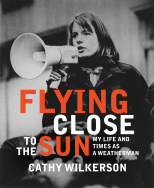Flying Close to the Sun: My Life and Times as a Weatherman

Despite the ongoing wars in Iraq and Afghanistan no one mistakes the rallying cry of today's Starbucks-toting, Hot Topic sporting protesters with the mobilized and systematic protests of the 1960s and 1970s. With not a small touch of nostalgia, those who were there for Vietnam, Civil Rights and Cambodia lament the laziness of present-day youth to fully posit themselves in the movement (as if that responsibility belongs solely to folks without many responsibilities), while young people today tune-out the nagging and lectures of their middle-class, once hippie parents. In much the same way that intergenerational silences ebb and flow through suburbia, urbania, and rural towns alike, Cathy Wilkerson's [Flying Close to the Sun: My Life and Times as a Weatherman]](http://www.amazon.com/gp/product/1583227717?ie=UTF8&tag=feminrevie-20&linkCode=as2&camp=1789&creative=9325&creativeASIN=1583227717) details—sometimes in excruciating detail—the rise and fall (and rise) of a former SDS member who, in 1970, survived the accidental bombing of her parents' townhouse, when three others did not. Even Wilkerson, however, fails to carry through the spirit and message of the counterculture of her youth beyond the spectacular flame of '60s and '70s activism.
Wikerson must be credited for her vigilance towards cross-sections of race, socio-economics and gender in her memoir, as well as her attention to the eventual realization that the progression among some activists from peaceful protest to bombings of government and non-government buildings was no different than the operations of Nixon, Kissinger and the like. Wilkerson's meticulous detail of the events of her life, from childhood in New England to her involvement in grassroots activism, gives the prose a meandering style neatly captured by chapter divisions. Wilkerson is a woman trying to find herself in changing era, adrift in relationships, war policy and her white privilege, all of which receive equal weight and importance in the threads of her memoir.
While knowing everything about her early childhood slows down the first portion of the book considerably – not that we don't care but, well, we don't—once Wilkerson hits on personal and political events, the narrative dashes through essential persons, locations, conferences, marches and protests like a "Not For Tourists" guide of the era, losing itself only at the moment when it counts most—connecting the lessons of the past to the present in order to shape the future. Maybe Wilkerson feels she can't speak to activists today because the apparent apathy of youth is so at odds with her own formerly youthful self. Or maybe Wilkerson, who performs her activism through education now, is subtly telling us that of everything accomplished in a turbulent era, those things and people who were lost cannot justify the means. This subtlety doesn't cause the book to flop at the end, but it does sputter and then just stops, standing bewildered among all that remains and how little, after forty years, has really changed.
I agree, most definately. Especially the women in such a radical org that wasn't opposed to using property violence in direct action.
Ah nice, yet another addition from your reviews onto my Amazon wishlist. I find the Weathermen absolutely fascinating!